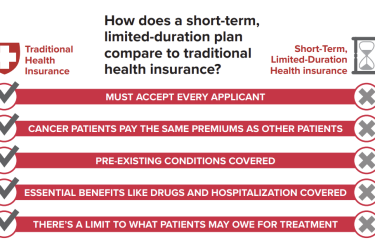
Under the most usual course of events, the Supreme Court would not consider (again) the fate of the Affordable Care Act smack in the midst of the 2020 presidential elections.
But we aren’t living amid “usual” course of events. A coalition of state attorneys general wants the legal process speeded up. And while it’s not that likely that the high court will agree, it’s not impossible either.
In December the Fifth Circuit Court of Appeals voided the ACA’s individual mandate. But it didn’t agree with the earlier District Court ruling from December 2018 that because the mandate is unconstitutional, the whole law is invalid. Instead the Appeals court ordered the lower court to reconsider that – setting in motion a process that could well end up in the Supreme Court but not for some time. (Reminder: The mandate is still on the books even though Congress in the 2017 tax overhaul zeroed out the penalty effective in 2019. In theory, a future Congress could restore a financial penalty.)
But in the first week of January 2020, 20 states plus the District of Columbia asked the Supreme Court to speed it up. (Here’s the filing.) They want the court to rule well ahead of the November elections, arguing that another year of uncertainty will further damage the U.S. health care system. Given that the Trump administration has not come up with a replacement plan, a rapid ruling prior to the elections could also provoke chaos not just for people who are covered in ACA markets but for the entire health insurance sector (including Medicare and Medicaid.)
“We’re asking the Supreme Court to swiftly resolve this repeal lawsuit for the sake of saving lives and ending uncertainty in our healthcare system,” said California Attorney General Xavier Becerra, who has taken a leading role in defending the health care law. The Trump administration has sided with the conservative states who brought the suit.
The Supreme Court usually doesn’t jump in until the lower courts have completed their review – but it only takes four of the nine justices to agree to hear a case. As Nicholas Bagley, the University of Michigan law professor who is an expert on health, noted in a quick and informative Twitter thread, it could happen.
1/ Will the Supreme Court agree to immediately hear Texas v. United States right now, as California and the House of Representatives have requested? The answer is: maybe!
— Nicholas Bagley (@nicholas_bagley) January 3, 2020
On one hand, the four liberal judges, knowing that they probably – not definitely, but probably – will be supported by Chief Justice John Roberts who has upheld the ACA twice in the past, might want it resolved ASAP (particularly given the chance that a future court might have fewer liberal judges).
On the other hand, letting the case go through the courts in its normal way (which is what the Supreme Court usually prefers to do) buys the ACA about three years. As we’ve seen, the law has grown more popular over time, and while it’s certainly not trouble-free, it’s reasonably stable, particularly given all the years of political attacks and the Trump administration’s opposition.
(Here’s a piece by Bagley in the Atlantic from December 2019 on the Fifth Circuit ruling. Spoiler alert: he thinks the legal argument is ridiculous. Yale Law School’s Abbe Gluck writes about it for the New York Times Opinion section here. Among other things, she explains the impact on people who have health insurance but not directly through the ACA.)








